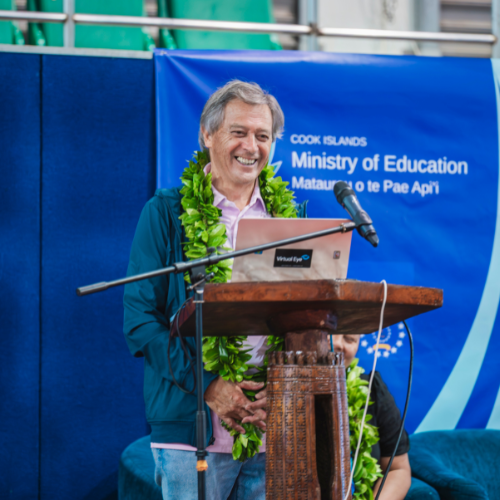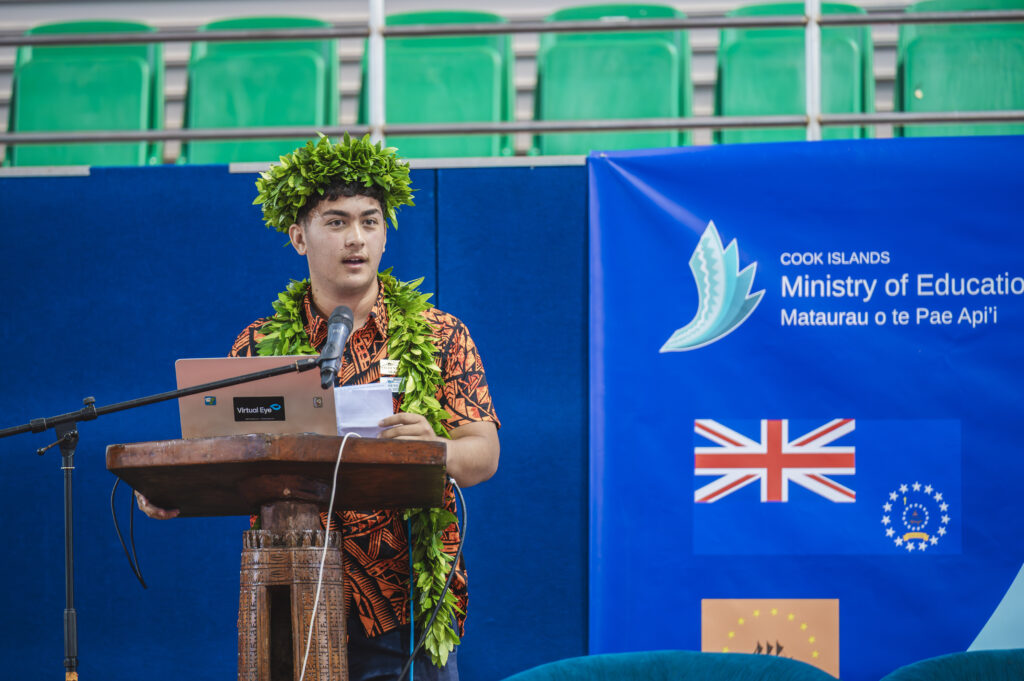Umeia Te Maro Kura Symposium 2025
Indigenous Education Conference Cook Islands 2025 - Reshaping Heritage and Education
About The Symposium
The Ministry of Education hosted the Umeia te Maro Kura Symposium to bring together voices from across the Cook Islands and the diaspora to reimagine our education system – one that uplifts our reo, revives our culture, and prepares our learners for success in both local and global worlds.
This four-day national event built toward a shared vision for:
- Heritage-based and immersion schooling
- Culturally grounded curriculum models
- Educational equity across Pa Enua and diaspora
- Global pathways through Cook Islands values
This journey is part of our Education Master Plan 2024 – 2034, underpinned by three key pillars:
- Learning and Educational Excellence,
- Corporate and Operational Strength, and
- Policy Innovation and Development.
Keynote Speakers
Our keynote speakers were carefully chosen for their leadership, lived experience, and deep commitment to indigenous education. Each one brought a unique perspective to help us reimagine a future where Cook Islands language, culture, and identity are at the heart of our education system — not as additions, but as foundations.

Māori innovator showing how digital tools and AI can bring ancestral knowledge into future learning.

Founding leader of kōhanga reo, sharing how grassroots action revived te reo Māori in Aotearoa.

Cook Islands academic exploring how education connects our global community and strengthens national identity.

Māori activist calling for bold, community-led education grounded in cultural sovereignty.

Former NZ Education Minister offering insights on dual pathways that balance culture and academic success.

Leaders in Māori education, building schools that integrate culture, sport, and high performance.
“Reignite the flame of our identity.”
-Ezekiela Tuatea Tatuava-Enjoy

Event Details
When – 5 – 8 May 2025
Where – National Auditorium
Who – Everyone who wants to be part of the conversation
Day 1 Summary
Day 1 of the Umeia te Maro Kura Symposium opened with powerful and emotional calls to action, urging us to centre language, culture, and identity as the foundation of education in the Cook Islands. Voices from students, traditional leaders, digital innovators, and cultural revivalists echoed a shared message: “If we lose our language, we lose ourselves.”
“Reignite the flame of our identity.” – Ezekiela Tuatea Tatuava-Enjoy
This day inspired a renewed commitment to:
Revive Cook Islands Māori through everyday use, not just classrooms
Empower communities to lead cultural education
Blend ancestral knowledge with emerging technologies
Redefine success — not just by exams, but by identity, belonging, and connection
Speakers like Sir Ian Taylor and Hilda Halkyard-Harawira shared how innovation and community leadership have restored Māori identity in Aotearoa — and challenged us to do the same, without waiting for permission or perfect conditions.
“Culture is not a subject. It’s the foundation.”
“Achievement is not just passing exams — it’s knowing who you are and where you come from.”
Day 2 Summary
Day 2 focused on strengthening the cultural bridges between Cook Islanders at home and abroad, recognising that the nation is not bound by its geography, but by its people, stories, and shared identity.
Opening remarks framed the day not as a crisis, but a moment of encouragement: to build cultural purpose into education and celebrate our transnational community.
“If we don’t build identity here, where will they learn it?”
Keynote Speaker: Prof. Nicholas Lewis
Education and Nation Building: Holding Cultural Communities Together
Prof. Lewis powerfully reframed the Cook Islands as a transnational nation, with its diaspora forming an essential part of our cultural and economic ecosystem. He called for:
- A curriculum that includes our stories, genealogies (akapapa‘anga), and knowledge systems
- A shift away from foreign-defined success toward Cook Islands values and identities
- Urgent investment in Māori-medium education, teacher status, and cultural innovation
Acknowledgement that conservatism in education is a risk in an AI-driven world — our culture is our greatest asset
“Education is how we hold our people together. Across oceans. Across generations.”
Panel: Connecting Across Oceans
Facilitated by Ngavaevae Papatua, the panel explored:
- Diaspora Cook Islanders as assets, not outsiders
- Technology as a cultural connector – from Zoom to language-learning apps
- Identity as a strategic advantage in life, work, and leadership
Strong calls for inclusivity, knowledge-sharing, and mutual respect between homeland and diaspora
“Use the white man’s tools to advance our own values.”
Community Reflections
Key Discussion Points:
- Tourism vs Culture: How do we protect identity while benefiting from tourism?
- Curriculum Sovereignty: Cook Islands needs a curriculum designed for us, by us
- Reclaiming Knowledge: Ui ariki and elders must lead in shaping curriculum – not just academics
- Redefining Success: Achievement means resilience, identity, and contribution – not just grades or jobs overseas
Takeaways from Days 1 & 2
Language must be normalised in homes, schools, and media
Identity is not optional – it’s the foundation of wellbeing and success
Education must evolve to reflect who we are and where we’re going – grounded in culture, prepared for the world
Day 3 Summary
Day 3 of the Umeia te Maro Kura Symposium delivered a powerful message: true educational transformation begins at home, from our cultural core.
Keynote speaker Hone Harawira issued a bold challenge – urging the Cook Islands to stop waiting for permission and start building its own culturally grounded education system. He drew on decades of Māori resistance to show that language and identity revival are not given – they are fought for, lived, and led by the people.
“Happy are those who dream dreams, and are prepared to pay the price to make those dreams come true.” – Hone Harawira
He warned against the continued reliance on foreign education models and systems, calling instead for community-led schools, Māori-medium teaching, and a deep rethinking of how we define success.
Panel: Are We Leading Our Own Future?
Panelists explored whether the Cook Islands is truly charting its own course or still following colonial templates. Speakers including Rev. Tere Marsters, Cecilia Short, Dr. Teina Rongo, Hon. Tina Browne, Nareta Huata, and Mike Tavioni reflected on:
- The internalisation of foreign values and how this weakens cultural identity
- The fear of speaking reo Māori publicly and openly
- The need to decolonise mindsets, systems, and everyday life
- Community-based leadership as essential for cultural revival
- The urgency of protecting land, language, and cultural knowledge systems
“Speaking Māori should be fashionable — not occasional.”
“Resistance is survival. Culture is resilience.”
Core Themes from Day 3
- Language is Survival
Te reo Māori is not just a language — it’s the foundation of who we are. Without it, we risk losing everything.
- Education as Resistance
Systems borrowed from elsewhere will never free us. Our own values, stories, and land must define how we teach.
- Community-Led Change
Courageous leadership must come from within: elders, families, churches, diaspora, and culture-bearers.
- Systemic Transformation
We are beyond tweaking policies – we must rebuild our education system from the ground up, with Māori identity, language, and values at the centre.
Day 4 Summary
Day 4 of the Umeia te Maro Kura Symposium marked a shift from vision to action.
The call was clear – we must move from conversation to commitment – and redesign our education system to uplift identity, language, academic excellence, and community values.
“Now is the time to unite as a people, use what we have, and serve our nation by lifting up the next generation.” – Wallace Aroita
From powerful keynote presentations to passionate community reflections, the message was unified: the Cook Islands must commit to a dual-pathway model – one that centres Cook Islands Māori identity while preparing students for global opportunities.
Keynote speakers:
Kelvin Davis
Called for a clear, shared dream. Transformation, he said, needs a “lean, mean team” to lead — small, skilled, committed. He urged us to start now and not wait for perfect conditions.
“A dream without action is just a speech.”
Nathan & Yvette Durie
Shared the success of Tu Toa and Manukura — education models that combine academic excellence, sport, and cultural identity. They urged Cook Islands leaders to normalise success, support whānau-led education, and build learning environments where identity thrives.
Panel Discussion: Voices from the Community
Speakers included: Wallace Aroita, Angela Pier, Sieni Passfield, Siana Whatarau, Mike Mokai, Michael Papatua, and Tetangi Matapo
Core Messages:
Culture must be the foundation, not an add-on
- Immersion education works – when fully supported and resourced
- Reo Māori must be visible, spoken, and celebrated – in businesses, classrooms, homes
- Teachers must be valued, trained, and resourced – particularly in language immersion
- Success must be redefined: Cultural confidence is just as important as academic success
- The system must meet the needs of our tamariki, not the other way around
- We cannot wait – pilot models must begin by 2026
“I want to be an A-class Cook Islander, not a B-class New Zealander.” – Ezekiela Tuatea
“Let your yes be yes. Let your no be no.” – Michael Papatua
“Faith, hope, and love — and the greatest of these is love.” – Tetangi Matapo
The Way Forward
The day closed with a call to action. The time for passive planning is over. We now begin:
- Designing two full immersion schools by 2027
- Building a curriculum from culture first
- Supporting educators as cultural leaders
- Bridging academic success with cultural pride
- Recognising diaspora, ariki, churches, and community as pillars of change
MC Ngavaevae Papatua concluded:
“There is a problem. We need a solution. And the work starts now. It starts with me.”
What Happens Next?
Establishing heritage-based
and immersion schools

Integrating indigenous knowledge and values into curriculum

Strengthening education for diaspora connection and belonging

Creating a dual-stream system that delivers both cultural and academic excellence

Resources
Symposium Booklet 2025
Download Attachment
Register For The Next Indigenous Education Event
Sign Up Here For The Next Event
Join Our Newsletter
Subscribe to receive our latest updates in your inbox!
